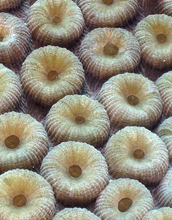Multimedia Gallery
Coral Reef Polyps
Coral reefs are formed from calcium carbonate secreted by tiny animals called polyps. These colonies of polyps and the reefs they create are among Earth's most diverse ecosystems, providing shelter for a wide variety of fish, mollusks, sponges and other sea creatures, and a basis for economy for tourism and the fishing industry. Corals are highly sensitive to both warming ocean temperatures and ocean acidification brought about by increased atmospheric carbon dioxide. Scientists from the National Center for Atmospheric Research are studying the effects of warming and acidification on reefs and the marine populations they support. (Date of Image: unknown)
Credit: Photo by Kathy Krucker; ©University Corporation for Atmospheric Research
Special Restrictions: This image is licensed under a Creative Commons (CC) Attribution-Noncommercial 3.0 Unported License.
Images and other media in the National Science Foundation Multimedia Gallery are available for use in print and electronic material by NSF employees, members of the media, university staff, teachers and the general public. All media in the gallery are intended for personal, educational and nonprofit/non-commercial use only.
Images credited to the National Science Foundation, a federal agency, are in the public domain. The images were created by employees of the United States Government as part of their official duties or prepared by contractors as "works for hire" for NSF. You may freely use NSF-credited images and, at your discretion, credit NSF with a "Courtesy: National Science Foundation" notation.
Additional information about general usage can be found in Conditions.
Also Available:
Download the high-resolution JPG version of the image. (3.5 MB)
Use your mouse to right-click (Mac users may need to Ctrl-click) the link above and choose the option that will save the file or target to your computer.



